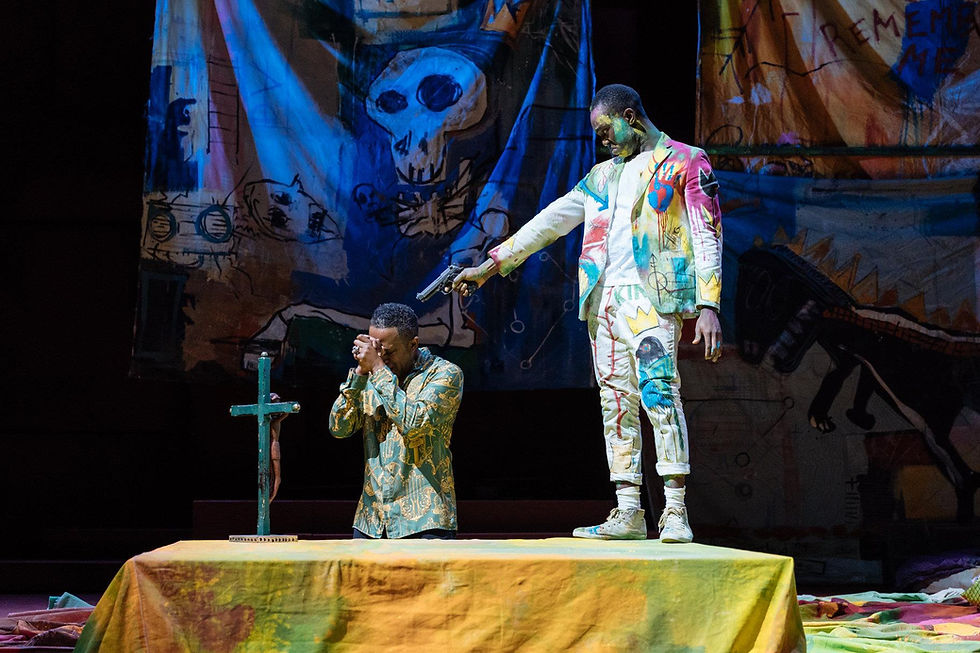The Royal Shakespeare Company (‘RSC’) has a reputation for staging some quite ‘out there’ adaptations and their 2016 production of Hamlet, directed by Simon Godwin, is no exception to this.
This production boasts a predominantly black cast and re-imagines Denmark as a modern military state which encapsulates the vibrant culture of Africa. Rising star Paapa Essiedu (Murder on the Orient Express, I May Destroy You) demonstrates an impressive emotional range as Hamlet. As a testament to this, tears frequently course down his cheeks during his impassioned soliloquies and drops of spittle can sometimes be seen flying from his lips during his fits of rage. His grief, confusion, and moral outrage are palpable in the play’s opening scenes; the audience is likely to sympathise with the grieving prince who cannot comprehend his mother’s unprincipled decision to marry her dead husband’s brother just months after her former husband’s death. To help him grapple with this inner turmoil, Hamlet trades his funeral suit for a paint-stained shirt and jogging bottoms which are both emblazoned with skulls and crowns. He then proceeds to deface the royal portrait with graffiti and sticks toilet door signs on the royal thrones for good measure.
Hamlet’s mood becomes increasingly changeable as the play progresses. At one moment, he’ll be spouting puerile, sarcastic backchat and at the next, he’s prepared to resort to physical violence. The majority of critics found Essiedu’s Hamlet to be affable. Whilst he was a character I could sympathise with at times, I did not actively like him (largely because his childish sarcastic wit grated on me). One slightly petty gripe I have is that I found Essiedu’s mannerism of repeatedly scratching his left leg throughout the performance distracting (plus I genuinely couldn’t tell if this was part of the act or if he was really dealing with a particularly bothersome, persistent itch!)

The standout performance for me was given by Mimi Ndiweni as Ophelia. In the play’s first half, she is a sparky and animated young woman who unashamedly groans aloud when her brother Laertes (Buom Tihngang) warns her not to lose her virginity to Hamlet. The pair share a warm, playful, and convincing sibling relationship. The contrast between Ophelia in the play’s first half and in the second couldn’t be more marked. After she is physically assaulted by Hamlet and learns of her father’s death, she spirals into a lamentable madness.

The supporting cast is generally impressive. Clarence Smith’s Claudius is formidable and commanding. Gertrude (Lorna Brown) privately relishes the physicality of her relationship with her new husband yet transforms into an unnervingly placid queen in public settings. The scene where Hamlet confronts his mother was especially well done; you could almost see the switch flick inside Gertrude’s brain when she realised that her sordid marriage to her husband’s brother had inflicted irreparable damage to her relationship with her son. Polonius (Joseph Mydell), a loquacious buffoon who is merely tolerated by those around him (minus his children of course), is responsible for much of the play’s humour. Ewart James Walters plays an imposing Ghost that rises and descends from the stage amidst a multitude of fog and dazzling light, to the bellowing clamour of the onstage percussion.

The vibrant costuming and staging really lend themselves well to this digital format. That being said, I had to suspend my disbelief every time a character mentioned ‘Denmark.’ It would have made more sense to me had they simply re-named the settings. Transitions between scenes are always faultless and slick. The African drumming which punctuates the piece really helped to push the play’s action on, although there were occasional lulls in momentum (in my opinion, the scenes including the players tended to drag a little). Although this adaptation looks rather radical aesthetically, somewhat surprisingly, the play text is barely altered. Traditionalists will appreciate that all the famous lines and soliloquies are present with only minor revisions. However, I would have been grateful had the cast varied the delivery of their lines a little more. The actors all had a tendency to utter their lines with a certain impassioned breathlessness which does begin to lose its effect after a few hours. Therefore, some greater contrast in pitch and forcefulness wouldn’t have gone amiss. I also thought that the occasional one-liners which inflected the piece tended to fall a bit flat.
Whilst this was a decent adaptation, it wasn’t really my cup of tea. I wasn’t totally on board with the ‘Hamlet-come-artist’ take although it certainly was a fresh approach. I would rate this performance 3.5/5 stars (although, for reference, my mum is on the side of the critics and would award this adaptation 4/5 stars).
The RSC’s 2016 adaptation of Hamlet is available on BBC iPlayer for a limited time.

(none of my own images)
Comments